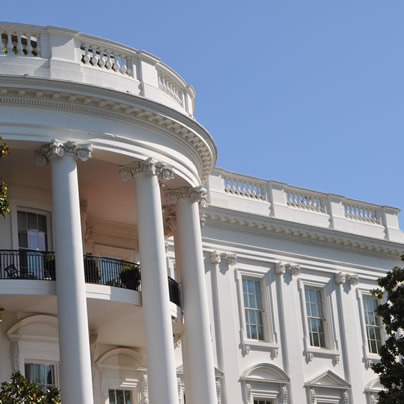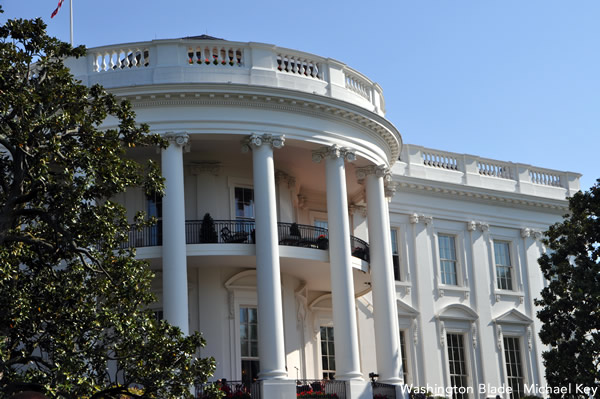National
54 groups call on Obama to take action for bi-national couples
Letter asks DHS to place on hold marriage-based green card applications


54 groups are calling on the White House to hold the marriage-based green cards for bi-national couples in abeyance. (Washington Blade file photo by Michael Key)
A coalition of LGBT and immigration advocacy groups are teaming up for the first-time ever to call on the Obama administration to take action on behalf of bi-national same-sex couples in the wake of the Supreme Court’s decision to take up litigation challenging DOMA.
In a letter written Monday to President Obama and other administration officials, the groups call on the administration to place on hold the marriage-based green card applications for bi-national same-sex couples as observers await a final decision from the Supreme Court on DOMA’s constitutionality.
“With the Supreme Court’s decision to rule on DOMA’s constitutionality, we will know by next June whether or not applications for lawful permanent residence for lesbian and gay spouses will ultimately be approvable,” the letter states. “Therefore, we are only asking that, in the interim, these applications be held for a period of a few months. Doing so will prevent extreme hardship to lesbian and gay immigrant families. By holding applications for lawful permanent residence in abeyance neither granting them nor denying them LGBT families can remain securely together in the U.S. until the Supreme Court issues its ruling next year.”
Among the 54 signatories of the letter are LGBT groups such as Immigration Equality, the Human Rights Campaign and the National Gay & Lesbian Task Force as well as the immigration groups such as the Mexican American Legal Defense & Educational Fund (MALDEF) and the National Council of La Raza.
Rachel Tiven, executive director of Immigration Equality, said in a statement the Supreme Court’s decision to rule on DOMA signals the anti-gay law is near its end, which creates an opportune moment for the Obama administration to take action.
“The Supreme Court’s decision to review DOMA means we now have a date-certain for a final determination about the law,” Tiven said. “It makes no sense to continue denying green card applications which, if the law is struck down by the court, would be approved. By holding these applications, the administration can ensure couples will not be separated or forced into exile.”
Straight Americans can sponsor their foreign national spouses for residency in the United States. However, that option isn’t available to gay Americans in legal same-sex marriages to foreign nationals because of the Defense of Marriage Act, which prohibits federal recognition of same-sex marriage. Under current immigration code, bi-national same-sex couples could be in danger of separation and the immigrant in the relationship without legal status could be subject to deportation. Legislation known as the Uniting American Families Act would address the issue, although the bill hasn’t moved forward.
In the letter, the groups advocacy point out that the Obama administration has taken a similar course of action in past — holding the green card applications of immigrant widows of U.S. citizens in abeyance while litigation was pursued on their behalf — in addition to holding in abeyance applications for HIV-positive foreign nationals while they awaited the end to the HIV travel ban.
Groups such as Immigration Equality have called on the Obama administration for some time to hold the marriage-based green cards in abeyance for bi-national couples, but each time in response the Department of Homeland Security says it will continue to enforce DOMA as long as it’s on the books. According to an article earlier this year in The Advocate, White House officials told LGBT advocacy groups during a meeting that the Obama administration would not take this course of action to help same-sex couples.
But Steve Ralls, spokesperson for Immigration Equality, said this letter marks the first time that LGBT and immigration groups have jointly made the request to the Obama administration.
“We have made the request before – prior to the SCOTUS cert announcement – with a smaller group of LGBT organizations,” Ralls said. “The coalition this time, however, is much larger and includes our allies in the immigration movement for the first time, too.”
In response to a request to comment on the letter, a White House spokesperson referred questions to DHS, which offered the same position articulated earlier.
Peter Boogard, a DHS spokesperson, said, “Pursuant to the Attorney General’s guidance, the Defense of Marriage Act remains in effect and the Department of Homeland Security will continue to enforce it unless and until Congress repeals it, or there a final judicial determination that it is unconstitutional.”
Amid calls to hold the marriage-based green cards in abeyance, the Obama administration has taken action to address the issue. Just last month, the Department of Homeland Security issued guidance stipulating immigration officers should consider “long-term, same-sex partners” as families when considering whether to exercise prosecutorial discretion in the potential deportation of an undocumented immigrant.
NOTE: This posting has been updated from its initial posting to reflect the comment from Steve Ralls.
New York
Two teens shot steps from Stonewall Inn after NYC Pride parade
One of the victims remains in critical condition

On Sunday night, following the annual NYC Pride March, two girls were shot in Sheridan Square, feet away from the historic Stonewall Inn.
According to an NYPD report, the two girls, aged 16 and 17, were shot around 10:15 p.m. as Pride festivities began to wind down. The 16-year-old was struck in the head and, according to police sources, is said to be in critical condition, while the 17-year-old was said to be in stable condition.
The Washington Blade confirmed with the NYPD the details from the police reports and learned no arrests had been made as of noon Monday.
The shooting took place in the Greenwich Village neighborhood of Manhattan, mere feet away from the most famous gay bar in the city — if not the world — the Stonewall Inn. Earlier that day, hundreds of thousands of people marched down Christopher Street to celebrate 55 years of LGBTQ people standing up for their rights.
In June 1969, after police raided the Stonewall Inn, members of the LGBTQ community pushed back, sparking what became known as the Stonewall riots. Over the course of two days, LGBTQ New Yorkers protested the discriminatory policing of queer spaces across the city and mobilized to speak out — and throw bottles if need be — at officers attempting to suppress their existence.
The following year, LGBTQ people returned to the Stonewall Inn and marched through the same streets where queer New Yorkers had been arrested, marking the first “Gay Pride March” in history and declaring that LGBTQ people were not going anywhere.
New York State Assemblywoman Deborah Glick, whose district includes Greenwich Village, took to social media to comment on the shooting.
“After decades of peaceful Pride celebrations — this year gun fire and two people shot near the Stonewall Inn is a reminder that gun violence is everywhere,” the lesbian lawmaker said on X. “Guns are a problem despite the NRA BS.”
New York
Zohran Mamdani participates in NYC Pride parade
Mayoral candidate has detailed LGBTQ rights platform

Zohran Mamdani, the candidate for mayor of New York City who pulled a surprise victory in the primary contest last week, walked in the city’s Pride parade on Sunday.
The Democratic Socialist and New York State Assembly member published photos on social media with New York Attorney General Letitia James, telling followers it was “a joy to march in NYC Pride with the people’s champ” and to “see so many friends on this gorgeous day.”
“Happy Pride NYC,” he wrote, adding a rainbow emoji.
Mamdani’s platform includes a detailed plan for LGBTQ people who “across the United States are facing an increasingly hostile political environment.”
His campaign website explains: “New York City must be a refuge for LGBTQIA+ people, but private institutions in our own city have already started capitulating to Trump’s assault on trans rights.
“Meanwhile, the cost of living crisis confronting working class people across the city hits the LGBTQIA+ community particularly hard, with higher rates of unemployment and homelessness than the rest of the city.”
“The Mamdani administration will protect LGBTQIA+ New Yorkers by expanding and protecting gender-affirming care citywide, making NYC an LGBTQIA+ sanctuary city, and creating the Office of LGBTQIA+ Affairs.”
U.S. Supreme Court
Supreme Court upholds ACA rule that makes PrEP, other preventative care free
Liberal justices joined three conservatives in majority opinion

The U.S. Supreme Court on Friday upheld a portion of the Affordable Care Act requiring private health insurers to cover the cost of preventative care including PrEP, which significantly reduces the risk of transmitting HIV.
Conservative Justice Brett Kavanaugh authored the majority opinion in the case, Kennedy v. Braidwood Management. He was joined by two conservatives, Chief Justice John Roberts and Justice Amy Coney Barrett, along with the three liberal justices, Sonia Sotomayor, Elena Kagan, and Ketanji Brown-Jackson.
The court’s decision rejected the plaintiffs’ challenge to the Affordable Care Act’s reliance on the U.S. Preventative Services Task Force to “unilaterally” determine which types of care and services must be covered by payors without cost-sharing.
An independent all-volunteer panel of nationally recognized experts in prevention and primary care, the 16 task force members are selected by the secretary of the U.S. Department of Health and Human Services to serve four-year terms.
They are responsible for evaluating the efficacy of counseling, screenings for diseases like cancer and diabetes, and preventative medicines — like Truvada for PrEP, drugs to reduce heart disease and strokes, and eye ointment for newborns to prevent infections.
Parties bringing the challenge objected especially to the mandatory coverage of PrEP, with some arguing the drugs would “encourage and facilitate homosexual behavior” against their religious beliefs.
-

 U.S. Supreme Court3 days ago
U.S. Supreme Court3 days agoSupreme Court upholds ACA rule that makes PrEP, other preventative care free
-

 U.S. Supreme Court3 days ago
U.S. Supreme Court3 days agoSupreme Court rules parents must have option to opt children out of LGBTQ-specific lessons
-

 India5 days ago
India5 days agoIndian court rules a transgender woman is a woman
-

 National5 days ago
National5 days agoEvan Wolfson on the 10-year legacy of marriage equality












